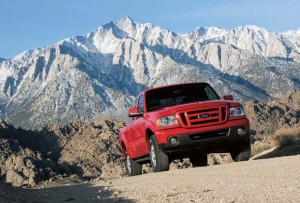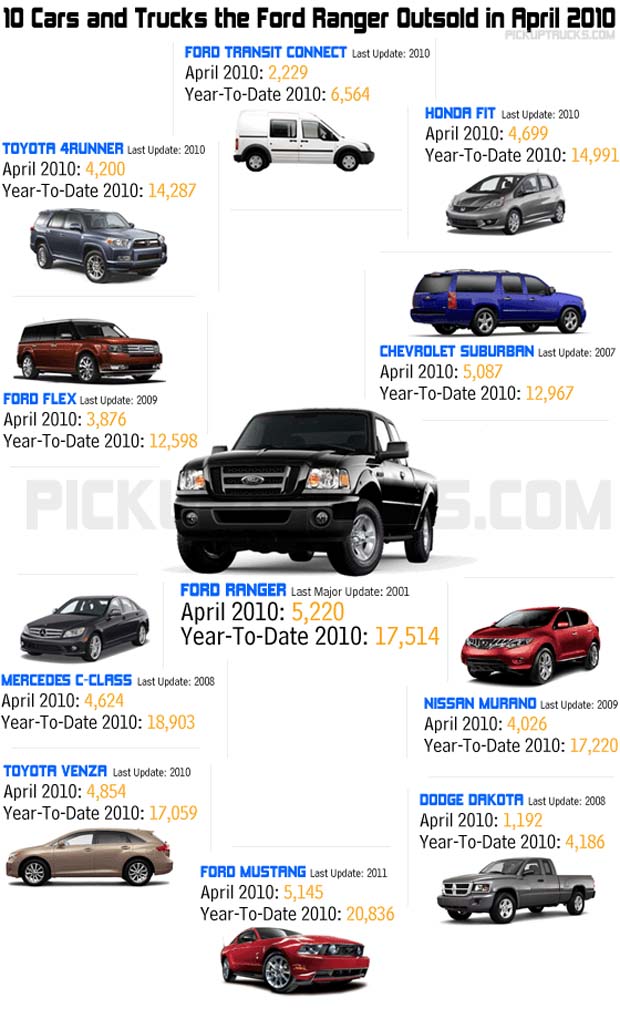It’s one of the oldest vehicles in the domestic fleet, regardless of manufacturer, and hasn’t gotten any significant mechanical update since 2001. It won’t meet upcoming changes to U.S. automotive safety standards. And, so far, there are no plans to bring it into the modern era. It would only seem like common sense for Ford to abandon the compact Ranger pickup, as planned, next year.
But there are plenty of reasons why the Detroit maker should keep the truck alive. Just look at the sales charts.
Our occasional contributor – and PickupTrucks.com publisher – Mike Levine calls to our attention the fact that despite its age, in a market where newer is normally better, the Ford Ranger is still a strong contender, and not just in its narrow market segment.
Last month, the automaker sold 5,220 copies of the pickup, while year-to-date Ranger sales ran 17,514 through April 30th.
Compare that to the Dodge Dakota, with April sales of just 1,192 and year-to-date numbers of 4,186. Okay, Dakota isn’t a stellar alternative, but so far this year, Ranger has outsold Toyota’s popular Venza (5,854/17,059); the Honda Fit (4,699/14,991), the Toyota 4Runner (4,200/14,287), Nissan Murano (4,026/17,220) and Chevrolet Suburban (5,087/12,967).
It’s even outsold one of the strongest import entry-luxury sedans, the Mercedes C-Class, with April sales of 4,624 – though the Baby Benz did score better for the year-to-date, at 18,903.
Closer to home, Ranger outsold Ford products including the Transit Connect, Flex and, gasp, even Mustang, which in April recorded sales of just 5,145. (But, like the C-Class, Mustang is a bit ahead for all of ’10, at 20,836.
Nonetheless, Ford is absolutely determined to kill Ranger, despite a brief reprieve. Talk of replacing it with a Thai-made compact pickup has been quashed. And there is absolutely nothing on the boards for the Twin Cities plant, in Minnesota, which would have likely gotten a Ranger replacement.
Instead, Ford is convinced it can fill in the gap with an alternative, lower-cost and more fuel-efficient version of the big F-150 pickup. Considering market trends, however, that argument generates plenty of skepticism.
What will happen to Ranger buyers? Whil some may upgrade to the F-Series, others will likely migrate to the Toyota Tacoma or even move out of pickups entirely. Some analysts believe that personal use pickup buyers could be ripe to return to the passenger car side, particularly into sporty coupes.
Ford isn’t the only maker hesitating to invest in the compact truck segment, however. Both Kia and Hyundai have spent several years studying their own options but have so far been unwilling to make the commitment to put something into production.
Check out the graphic, below, from our friends at PickupTrucks.com to get a sense of how the aged Ranger is still faring in the market.



I suspect the problem is tooling and engineering costs. Updating an old platform is expensive, and Ford is all about global platforms these days. If small pickups are a declining segment, it probably makes sense to invest in other segments which are more likely to pay off–like small cars, compact crossovers, etc.
You are likely right. This is the explanation long used. Nonetheless, the current sales numbers are surprisingly solid and the prices paid for Ranger are better than one might expect. With the global compact pickup one has to wonder if there just isn’t some way to remain in the segment without prodding buyers into the larger F-Series.
Paul A. Eisenstein
Publisher, TheDetroitBureau.com
It seems to me the basis for your statistics is flawed. In my opinion, you(Pickup Trucks.com) are certainly not comparing apples with apples. The only valid comparison in the group is the Dakota.
How can you lump the buyer of a C-Class Mercedes with a Ranger buyer. The buyers have completely different needs and motivation. The Ranger market compared to a Nissan Murano? I don’t get it!
I think Ford will be leaving a solid segment of the truck market to it’s competition. More and more contractors and service companies are looking for smaller, efficient, work trucks. I mutual friend recently paid a premium price for a used Ranger simply because he did not want or need a full sized truck.
Hi, Al, Bryan is correct. The comparisons were only to illustrate the point that Ranger still sells in a reasonable volume — numbers that other makers think are quite fine for a range of products, from Mustang to the Mercedes C-Class. I can only wonder what a truly world-class Ranger would do in the current market. Ford has some very interesting powertrains available for it. Of course, one key argument against compact trucks is that it’s hard to keep the price differential between them and full-sized models, like F-150, significant enough to justify the smaller products. In recent years, full-size pickups have become so affordable, on the bottom end, that many, many compact buyers have, indeed, migrated upwards. That seems to be why Ford is betting it can fill both niches with just the F-Series. Personally, I think that argument is flawed, however.
Paul A. Eisenstein
Publisher, TheDetroitBureau.com
@JerseyShoreAl, I think the comparisons to vehicles outside the small pickup categories was to illustrate a point, not to compare vehicles.
I have always been surprised that Ford would allow the Ranger to languish because there is an opportunity to build a true small pickup. All of its competitors have grown to the point that they are almost as big as the full-sizers.
Ranger is the only compact truck left for sale. Even the imports are midsize now.
Maybe Mahindra can fill the void when the Ranger is gone.
The original Explorer was made from a Ranger. Can the next Explorer be turned into a truck (not a SUT)?
Problem with a cheap F150 is fuel mileage will never be as good a lighter 4 cylinder.
It is interesting that Ford got so much criticism for not selling cars like the Fit but yet more people want Rangers than Fits.
Thanks for clearing up the comparison issue for me. I get it!
You would think Ford would understand that the numbers confirm a strong market for a true small pickup. Unfortunately the manufacturors can’t seem to learn that bigger is not always better!
Paul, I understand the affordability argument for a full-size truck but we seem to be forgetting where the buyer is coming from. The private owner that needs a small truck for weekend chores and uses it back & forth to work really doesn’t need the size & expense a full-size truck brings with it. Many buyers simply do not like to drive large vehicles, they want physically smaller vehicles. In addition, urban drivers buy small trucks because they easily navigate city streets. My point is the sales are what they are because the vehicle is filling a buyer’s need. If and when Ford pulls the plug on Ranger, those buyers will still have the same need and simply find another manufacturor to fill it.
Sorry Mr. Ford.
I do not understand corporate mentality. Here we have a market segment where Ford could be the “Lone Ranger” (pun intended) yet they seem to prefer to compete in the full-size market with several strong contenders.
An argument could be made that the Ford Transit Connect is a good alternative to a small pickup for someone needing a small vehicle than can carry small to moderate loads. It’s small and maneuverable, has similar load capacity to a ranger, gets about the same gas mileage as a 4 cylinder Ranger, has a battery only version on the way, and is priced competively. Hey, it even has a built in extra tall camper top as standard equipment. I think it makes good sense for Ford to concentrate their resources on this existing platform rather than coming up with a whole new one for a vehicle that largely duplicates it. Sure, it’s not a “pickup”, but so what? It’s way cooler looking and more versatile in a lot of situations.
Bryan, good point. See this story of ours for a related discussion.
http://www.thedetroitbureau.com/2010/01/first-look-renault-kangoo-tomtom/
Maybe they are looking to repeat the publicity they got from killing the tarus for a few years.
There was once an electric Ranger and a Saleen too.
But Bryan, while I agree that the TC can replace a lot of the Ranger’s usefulness, it still cannot do a lot of what we ask of a pickup truck. The TC has no tow rating, it’s not suitable for hauling a yard of dirt and it won’t go off-road.
Killing the Ranger isn’t the first time in recent years that Ford has abandoned a reasonably selling vehicle line, leaving others to fill the niche. As others have pointed out in the commentary, it mostly comes down to numbers, notably return on investment. There’s another subjective factor: many of Ford’s management got their bones in the European market, where pickups are virtually unknown; on the other hand, Ford killed the Focus wagon in North America while retaining it in Europe. Used Focus wagons command premiums in the marketplace, as Rangers will in the future.